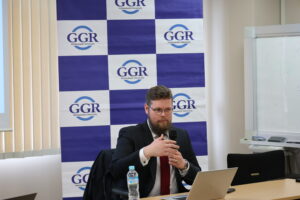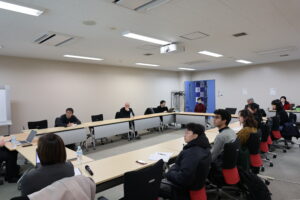On February 3, 2025, the Hitotsubashi University Institute for Global Governance Research (GGR) held the 36th GGR Brown Bag Lunch Seminar titled “Climate Change and China in the Arctic,” featuring Marius N. Pedersen, researcher with the Norwegian Defence Research Establishment (FFI). The seminar examined climate change and security developments in the Arctic, with a particular focus on China’s strategy.
Mr. Pedersen began by explaining climate change in the Arctic. As the region experiencing the fastest climate change on Earth, the Arctic—especially the Russian side, where the sea is relatively shallow—is seeing rapid ice melt, enabling access to new maritime areas. Additionally, the northward migration of fish stocks has increased interest in Arctic resources. While the Arctic remains a challenging environment for development, Mr. Pedersen noted that the emerging narrative of competition over Arctic resources is heightening security tensions and contributing to regional instability.
Traditionally, the Arctic had been somewhat shielded from international tensions under the concept of “Arctic Exceptionalism.” However, in recent years, the region has become more polarized: NATO member states now dominate the western Arctic, while Russia has strengthened its partnership with China. Mr. Pedersen expressed concern that this growing bipolarization is undermining Arctic Exceptionalism, which has long supported regional stability and cooperation. He also noted that discussions on the link between climate change and security are expanding beyond the “threat multiplier” perspective to include the view that climate change itself constitutes an independent security threat, necessitating analysis from both angles.
The seminar also delved into China’s Arctic strategy. China has been steadily increasing its engagement in the Arctic, particularly in utilizing northern sea routes and resource development, positioning itself as a key geopolitical player in the region. Politically, China challenges the existing international order and seeks to exert its influence in the Arctic as a major power. However, China lacks territorial rights in the Arctic and holds no legal rights over trade routes or resource access. Moreover, its status in the Arctic Council remains limited to that of an observer, posing constraints on its role. Mr. Pedersen suggested that as Arctic geopolitics evolve and climate change progresses, tensions between Western nations and the China-Russia bloc are likely to become more pronounced, increasing regional uncertainty.
During the Q&A session, discussions covered a wide range of topics, including issues related to Greenland, Russia’s perspective on China’s Arctic strategy, the Arctic policies of China and the U.S., Japan’s stance on Arctic affairs, and the impact of climate change on domestic politics. The seminar concluded by emphasizing that in the next decade, discussions will be particularly centered on Russia, while U.S. Arctic policy will also play a significant role in shaping regional dynamics.
【Event report prepared by】
Eru Watanabe (Master’s student, School of International and Public Policy, Hitotsubashi University)


